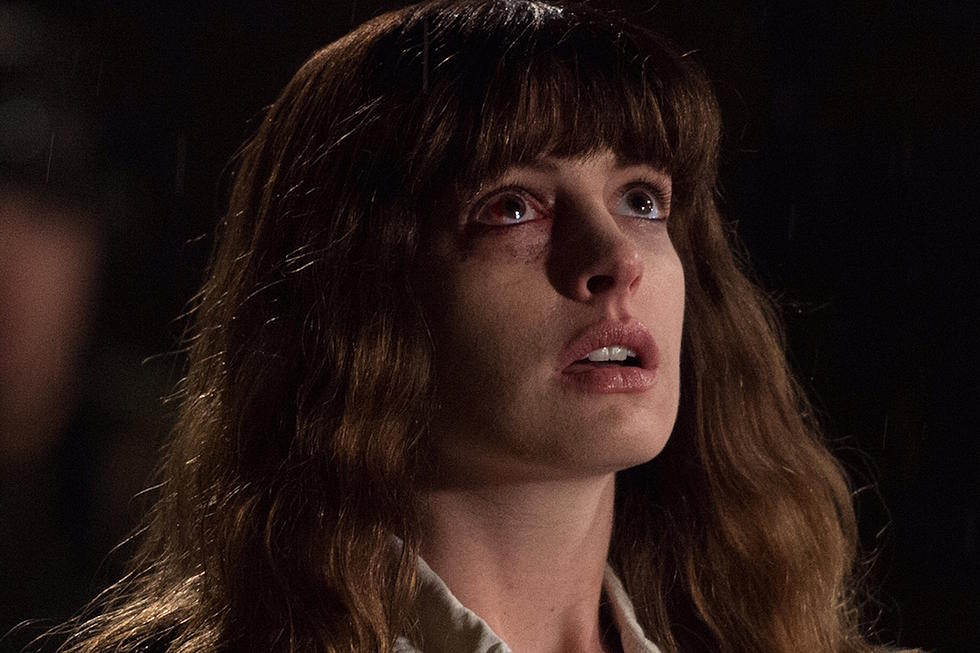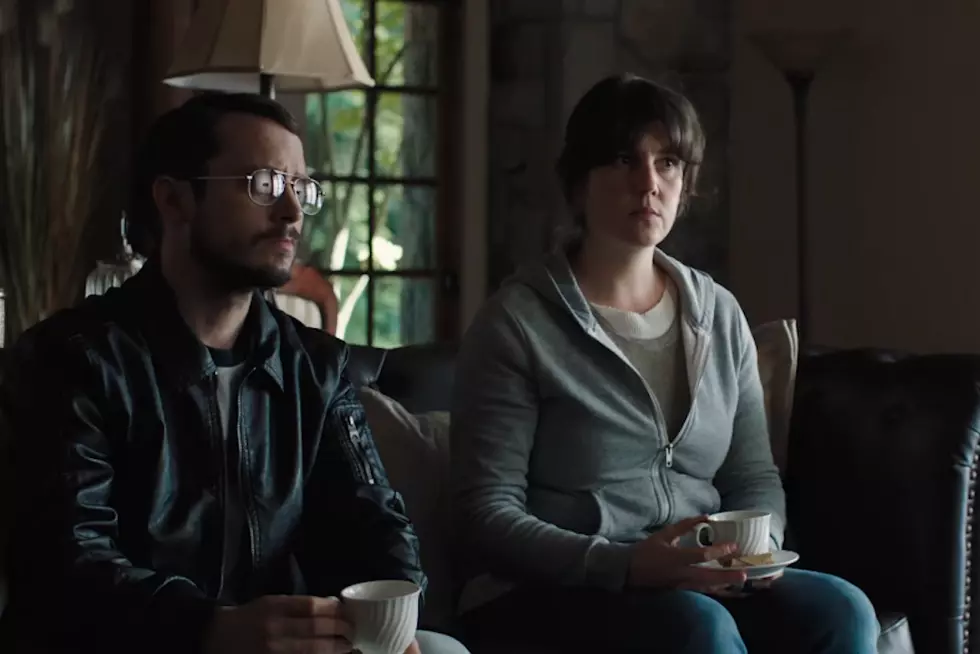
Elijah Wood, Sasha Grey and ‘Open Windows’ Director Talk the Horrors of Anonymity
'Open Windows' is director Nacho Vigalondo's most ambitious film to date. Starring Elijah Wood and Sasha Grey, the film examines our obsession with celebrity culture, and what happens when harmless obsession slides into violent entitlement. We had a chance to sit down with Vigalondo, Wood and Grey to discuss the thriller, which is told pretty much entirely through computer screens, webcams and security cameras. What follows is a fascinating interview about celebrity, internet personas, and why Vigalando doesn't like it when movies try to be important.
Here's what you need to know about the film: Wood plays Nick Chambers, a guy who runs an obsessive fan site dedicated to actress Jill Goddard (Grey). Nick is contacted by a mysterious man who offers him the chance to remotely stalk Jill's every movement, leading to an evening that escalates, putting Jill and Nick in increasingly dangerous situations. There's a lot going on in this film, both visually and thematically, and as such, we had plenty to talk about.
Well, this is a really ambitious project.
Nacho: I love to think that this is the biggest small movie ever, or the smallest big movie ever. I don’t know. I can tell that the size of the movie is something that is out of my control. I started the movie as a little indie film, but it took so much time in the making that, at this moment, I don’t know how big the movie is. I have a total lack of control over my own stuff.
Well, let’s start at the beginning, then. Where did you get the idea for this little big movie? Because there are a lot of ideas here.
Nacho: It interests me to make a movie about social media and internet, and have a big presence on screen. And I bring back the idea of taking things to the edge and making the whole movie in front of a computer screen. Actually, I think the initial inspiration came from the outside.
And how did you get Elijah involved?
Nacho: I already knew him, but I wrote the part thinking of him. At that time, when the process was being built, I didn’t want to show him the script when it was just a script, I wanted to wait until the movie [was] a real thing with real shooting and everything. I remember that, initially, it wasn’t possible because he was involved with another film at the time, and the dates were totally wrong, but later when the chance was real, I felt so happy to have the chance to show him the script when the movie was something for real. I was so honored that he said yes.
What about Sasha? How did you get her involved?
Sasha: Fought my way in!
Nacho: I got this list of choices that was made by the production company and from the very beginning she was a choice that was most exciting for me. I love her work in 'The Girlfriend Experience.' I feel really fortunate that my cast is the cast that I pictured from the very beginning.
There’s that element of the line between the public and the private persona of celebrity. Was that something that drew you to the script, Sasha?
Sasha: Definitely. I’ve had odd and scary experiences myself, so a lot [of] it was very real, and a lot of it was alien to me. I’m not this actress that gets followed around by paparazzi every day. I’ve already put myself out there for everybody to see everything, so in a way I have more privacy than an everyday actor because I’m not as interesting. There’s not something hidden that people want to expose, if you will. That part was different for me. But the feeling of having people want to pull you in all these different directions and not having control over your own life, and on top of it having someone literally and physically come after you, those are all very real and scary things.
Elijah, what did you think of playing a creeper character so soon again after your role in 'Maniac'? You’re getting a little too good at it.
[Everyone laughs]
Elijah: He’s not a creep!
I mean, he’s a sweet guy, but he kind of gets lured into being a creep. An unwitting creep.
Elijah: Well, he’s obsessed with this person.
He’s a different kind of a creep. He’s a lovable creep.
Elijah: Well it’s that thing of being online, where we kind of do things that are slightly morally ambiguous, where if we were faced with those same things in real life with a person we probably wouldn’t behave that way. I think in life he’s probably a really sweet guy, but he’s following this person, and because there’s that sort of relative distance and because it’s all online, he doesn’t really think anything of it. That fascinates me. I think we, in the online space, can be heinous individuals.
Sasha: Oh, yeah.
Elijah: We have no accountability for it, and think nothing of it. And that’s crazy to me, that we can sort of get into this space and because we’re not actually faced with someone we can do horrible things, and say horrible things, and yet not be held accountable for it. I think that’s an element to the film that I think is interesting, and it’s very, very true to what we experience in the online world.
Sasha: The power of anonymity.
Elijah: I think it gives people license to just do horrible things.
Nacho: Sasha is portraying a character that is a pretty character, and the way that Elijah stalks her is something uncomfortable and is not likable, but it is something that happens. It is something I experience all the time. I don’t know -- you are friends with a guy, and later you see how his virtual identity is and you are freaked out, and this guy is totally nasty, and it’s the same guy. I have some experiences, some really disturbing experiences about making friends and later realizing that this guy hates women on his Twitter account. I wanted to be honest about this. I wanted to talk about this openly.
I think there’s a slippery line between obsession and entitlement.
Elijah: Oh. We’re getting into something very interesting here.
I write about gender issues in film and television, and how tabloid culture often feeds into that. And the sense of entitlement we have toward celebrities is pretty disturbing. Where do we draw the line?
Elijah: The sense of entitlement is fascinating.
It seriously disgusts me.
Elijah: I keep up with it. It’s wild. People feel like they know you, they feel like you owe them something. It’s just based on their obsession on you or their interest in you. Somehow that is part of their life on a daily basis, so you’re a presence in their life in a way that … even though you’re not physically there. It’s bizarre.
I think the difference between your character and the mysterious Chord character who’s forcing you to terrorize Sasha is that you have a conscience. Your obsession with Sasha is more innocent, whereas his is more about that nasty entitlement.
Elijah: Yes. Certainly more representative of that. But I think the great thing, at least about the early part of the film, is that some of these actions that are slightly morally ambiguous -- may be a little bit wrong or very wrong -- are things that people do online that they don’t necessarily think anything of when they’re doing them. So as the character gets deeper into that, he starts to realize that these things are horrible and he doesn’t want to be involved anymore, and then it becomes about saving her.
Sasha, how did you feel about playing a "damsel in distress" type of character up to a certain point?
Sasha: It was interesting. I don’t think I’ve really played that role before. Nacho and I spoke a lot about how important [it] is when she takes control and essentially directs this movie or directs herself for the first time and takes charge.
Elijah: It’s such a great scene.
It is! Because you’re basically playing it in layers. You’re an actress playing an actress who has to act her way out of something without someone realizing she’s acting. It’s a Russian nesting doll effect.
Elijah: Yes, exactly.
You pull it off brilliantly.
Sasha: Thank you!
Nacho, can you speak to the visual components of the film? There are a lot of moving parts to this.
Nacho: Initially the movie had a lot of social media elements. It was a lot of Facebook. Closer to 2013’s ‘Noah,’ which is an amazing short film made initially in the way of this movie. That represents the initial idea of the way we made this movie. But I realized pretty soon that if I tried to make a movie years in advance, it’s going to feel dated, no matter what I make. Movie-making is slower than technology, so it was going to fail. I decided to create something that is pure fiction, something that doesn’t exist in this reality. It’s almost a computer that is from an alternative reality. Some things feel real, and some things feel science-fiction. Some devices are pure science-fiction. I decided to go crazy in that sense and not to feel like I had to follow specific rules.
What do you hope people ultimately take away from the experience of your little-big movie?
Nacho: I love films that work in both ways. It’s a crazy story with lots of twists. This is a meaningful thing. I’m okay with both. So if people walk away from the cinema thinking they’ve just seen a funny chase story, I’m okay with that. I don’t want to impose a theme behind the movie. I think the movie should talk by itself. I don’t like when the author is trying to make sure that the movie is important. I don’t like when the author is really focused on trying to make the movie feel important, and in fact, I don’t like when movies themselves try to be important. I prefer when you find something inside of a movie instead of being told from the title.
'Open Windows' is available now on VOD, and will hit select theaters on November 7.
More From ScreenCrush









